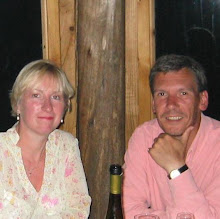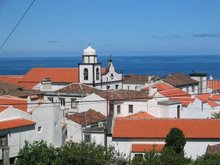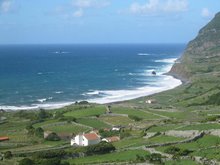
I have a cup of instant coffee every morning but coffee doesn't grow on this island so it has to be imported. Depressingly few daily staples are produced on Flores except for bread (although the flour is imported), cheese, yoghurt and a tiny percentage of the vegetables you can buy (in season of course).
The same is true of most places: coffee doesn't grow in Scotland either but I can buy Nescafé in Tesco in Edinburgh because it's imported there too. How does it get to Edinburgh? In trucks which thunder up and down motorways 24 hours a day. We all slag truck drivers off for their driving and - ahem - supposed other habits, but we'd be lost without them: no truck drivers, no Nescafé.
Incidentally, why don't train drivers and airline pilots get the same stick as truckers? Airline pilots deserve a lot of stick in my book for being crashingly boring conversationalists: have you ever heard one talk about anything other than the weather? Can you imagine the chat at a British Airways staff party: "It was 21 degrees with a brisk easterly wind in Paris yesterday." "Funny you should mention that because there were spots of rain at Bucharest ..." But I digress.
No motorways to Flores so the Nescafé - and everything else not on the short list mentioned above - has to come on a container ship. This one:-
 It arrives every second Thursday. Towards the end of each two week cycle, the fresh veg on offer in the shops is looking "tired" at best and non-existent at worst. We go shopping in Santa Cruz every second Friday for obvious reasons. But it's not to be taken for granted that the ship will have arrived on the Thursday - quite often it's delayed by weather. In winter sometimes it has to stand offshore to await suitable conditions to berth as Lajes das Flores (above) is not the most sheltered of harbours. Occasionally, it turns around without making the call at all: in March 2006, supplies of some commodities were running very low with the threat of bottled gas having to be rationed due to the ship not being able to berth for about 4 weeks due to a run of bad weather. Although if you think that's bad, it was only in 1993 that Flores got a pier the ship could berth at. Before then, it waited offshore and small open boats went out to collect the supplies, an operation infinitely more at risk of weather interruption so there was often the risk of key supplies getting critically short in winter. So much so that a successful call by the ship was known as Dia de São Vapor - literally "Saint Steamer's Day"
It arrives every second Thursday. Towards the end of each two week cycle, the fresh veg on offer in the shops is looking "tired" at best and non-existent at worst. We go shopping in Santa Cruz every second Friday for obvious reasons. But it's not to be taken for granted that the ship will have arrived on the Thursday - quite often it's delayed by weather. In winter sometimes it has to stand offshore to await suitable conditions to berth as Lajes das Flores (above) is not the most sheltered of harbours. Occasionally, it turns around without making the call at all: in March 2006, supplies of some commodities were running very low with the threat of bottled gas having to be rationed due to the ship not being able to berth for about 4 weeks due to a run of bad weather. Although if you think that's bad, it was only in 1993 that Flores got a pier the ship could berth at. Before then, it waited offshore and small open boats went out to collect the supplies, an operation infinitely more at risk of weather interruption so there was often the risk of key supplies getting critically short in winter. So much so that a successful call by the ship was known as Dia de São Vapor - literally "Saint Steamer's Day"
So, every other Thursday, Carol asks "Is the boat in?" I can tell the answer to this in one of two ways: if it's early doors, I can tell by the boxes of fresh fruit and veg (etc.) in the village shop when I've been down to get the bread. Otherwise, you can look at the webcam over the harbour at Lajes (library picture below).
So I hope that explains why, when you ask for something in a shop here, you often get the answer pode ser no proximo barco - maybe on the next ship. But even if it is on the next ship, you never quite know when it will be available: that's living on an island for you!
The weather, incidentally, is 21 degrees with a light north westerly wind.




1 comment:
I trust you keep a small stash of instant coffee and other non-perishables against the risk of the ship not arriving on schedule :-)
This also explains yet another reason why the typical Florentino household raises a quintal (kitchen garden) featuring such staple crops as potatoes, onions and couves portuguesas (basically kale), since gardening can be pretty much of a year-round endeavor in the mild Azorean climate.
It also explains why, besides poverty, their ancestors made use of indigenous foods available free for the gleaning, including agrião (watercress) for soup and musgo (moss) for fritters -- though I can't imagine succeeding in rinsing out all the grit from the latter, since even on the former it can be a real challenge.
Post a Comment